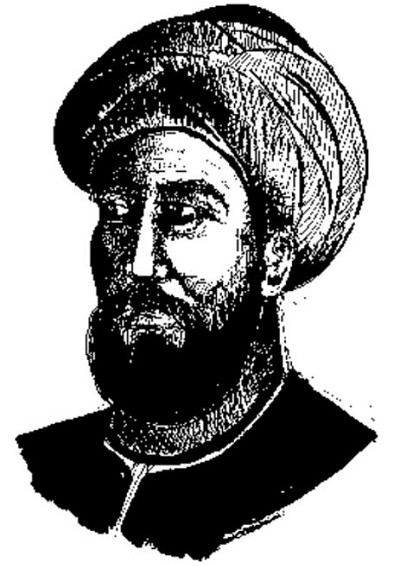Encyclopedia of the grandfather of modern surgery
Al-Zahrawi laid the first foundations for modern surgery with the invention of cat's gut sutures or marked the incision by ink on patients before surgery.
Al-Tasrif: Encyclopedia of modern surgery
The 8th to 13th centuries are often referred to as the golden age of Islam. The Muslim community produces many scholars with important contributions to the branches of human knowledge, including philosophy, mathematics and astronomy.
The Islamic wisdom during this period also contributed many achievements to world medicine, including: Ali ibn al-Abbas al-Majusi (Latin name Haly Abbas), Muhammad ibn Zakariyã Rãz (Rhazes or Rasis), and Abù al-Qãsim Khalaf ibn al-'Abbãs az-Zahrãwĩ (commonly known as Al-Zahrawi, or Abulcasis), who was dubbed the ancestor of modern surgery.

Portrait of Al-Zahrawi - "ancestor of modern surgery".(Photo: Public Domain).
Al-Zahrawi's life
Al-Zahrawi was born in the Al-Zahra region, near Cordoba, Andalusia, in southern Spain in 836. It was one of the most prosperous periods of the Umayyad Caliphate in Cordoba. However, not much writing about Al-Zahrawi's life was found.
Al-Zahrawi was given a very good medical genius. For 50 years, he held the position of the abbess for Cordoba's second king, Al-Hakam II, and al-Mansur, who had a real power to rule over the Islamic state after the death of Al-Hakam.
Despite the high and respected title, Al-Zahrawi continues to visit many people regardless of wealth. This allowed him to meet many patients every day, recording the health status and treatment history for each person individually. Thanks to his extensive knowledge and experience in his medical practice, Al-Zahrawi left behind a great encyclopedia of precious medicine called Al-Tasrif li man ajaz an-ti-talif . is Al-Tasrif .
Al-Tasrif: Medical encyclopedia
Al-Tasrif is considered a very important work in medical history, because it is one of the standard references in the medicine of Muslims and even Europe for more than half a century.
"About 1000, Dr. Al Zahrawi published the 1,500-page encyclopedia of surgery. This book was used as a reference in medical research 500 years later."

Illustrative and annotated images of surgical instruments in Al-Zahrawi's Tasrif.(Photo: Public Domain).
The medical encyclopedia was written around 1000 in 30 chapters. Each chapter addresses a different medical problem with a description of more than 300 diseases and treatments for the disease Al-Zahrawi collected.
Other aspects of medicine are also discussed in Al-tasrif. For example, in one of the first chapters, Al-Zahrawi wrote about how to diagnose the disease. He said that a good doctor must rely on his own observations and symptoms to diagnose, rather than just follow the patient's words.
Al-Zahrawi also writes about the relationship between health and nutrition. Many parts of Al-Tasrif present about the foods to avoid, the importance of maintaining a healthy menu, and using food as part of healing.
Al-Tasrif: A precious heritage for modern surgery
According to many experts, chapter 30 is the most influential part of the medical encyclopedia Al-Tasrif. In this chapter, Al-Zahrawi has laid the first foundations for the field of surgical surgery whereby he is dubbed the "ancestor of modern surgery".
The content of this section includes detailed explanations of Al-Zahrawi about the procedures for each specific surgery, listing about 200 surgical instruments with descriptions and illustrations (pictures of surgical instruments considered the earliest in history) and improvements made by Al-Zahrawi which were later applied in surgery.
Al-Zahrawi is said to be the first surgeon to use a cat's intestine to stitch the wounds inside . This type is only made from animal intestines, can digest itself and for a long time become the only type of surgical suture. Using only cat gut, doctors will not need a second surgery to remove the suture inside.

One page in Tasrif, the Latin translation of Peter Argellata, features surgery and surgical instruments.(Photo: Public Domain).
In addition, Al-Zahrawi is considered a pioneer to make an improvement that later became standard in the surgical industry, which is the use of ink to mark incisions on the patient's body before surgery.
Great contribution to medicine in many areas, especially in the anatomical branch, Al-Zahrawi laid the first foundations and made improvements still applicable today. However, the name of this talented Muslim doctor is not well known.
- Online animal encyclopedia
- 88-year-old grandfather was hypnotized for heart surgery
- Publications Britannica encyclopedia stopped publishing
- The massive 'unbelievable' of Wikipedia's encyclopedia opens
- Heart surgery at age 106
- The encyclopedia of life has achieved 170,000 titles
- How to perform 'body grafting' from scary to modern
- Wikipedia and mischievous games
- How do endoscopic robots help the Cho Ray hospital doctor?
- The benefits and harms of new 'no touch' myopia surgery in Vietnam
- Is the stomach shrink surgery for weight loss really safe?
- New step in lung cancer surgery
 Discovered an ancient centipede fossil 99 million years old
Discovered an ancient centipede fossil 99 million years old Discovered bat-like dinosaurs in China
Discovered bat-like dinosaurs in China Discovered a 200-year-old bronze cannon of the coast
Discovered a 200-year-old bronze cannon of the coast Discover 305 million-year-old spider fossils
Discover 305 million-year-old spider fossils